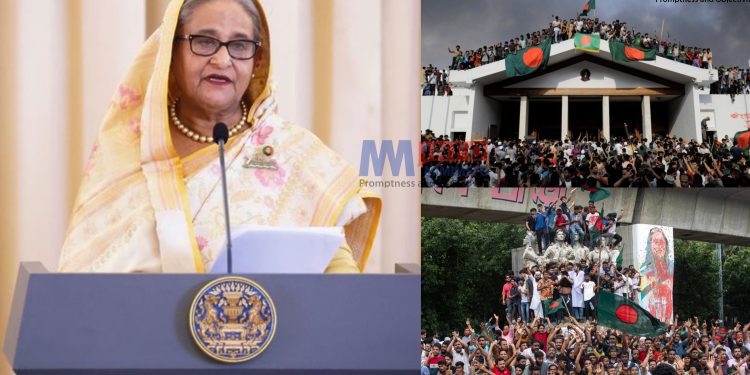Dhaka, Bangladesh August 2024 — The military in Bangladesh declared on Monday that it had taken charge of the government, promising to supervise a temporary administration until fresh elections can be conducted. Following weeks of intense student-led protests and a wave of violence, an unexpected development has occurred, leaving the country in a state of upheaval. The head of the armed forces, General Waker-Uz-Zaman, has appealed for calm and requested that demonstrators go back to their homes. He has also assured that there will be a thorough investigation into the recent violent clashes.
“The country has suffered a lot,” General Waker said.
The protests, which began with calls for more equitable access to government jobs, have evolved into a larger movement advocating for justice and political reform. The students initiated their demonstrations by demanding the elimination of a contentious quota system that allocated 30% of government jobs to the descendants of those who fought in Bangladesh’s 1971 independence war. The recent Supreme Court ruling on the quota issue has sparked ongoing protests, with the government’s harsh response fuelling the movement and ultimately leading to the resignation of Prime Minister Sheikh Hasina.
Hasina, who has held power since 2009 and previously from 1996 to 2001, left the country on Sunday night, allegedly by helicopter to India, where she is anticipated to seek asylum. Her departure signifies the conclusion of a significant era for the Awami League, the party established by her father, Sheikh Mujibur Rahman, a pivotal figure in Bangladesh’s fight for independence. Although Hasina’s rule has seen notable economic development, particularly in the garment sector, it has also faced criticism for its growing authoritarianism and numerous human rights abuses.
Recently, the government’s response to protests has been severe, resulting in the loss of many lives and the detention of a large number of individuals. The situation escalated dramatically when security forces, accompanied by members of the ruling party’s student wing, reportedly resorted to the use of live ammunition and machetes against the protesters. During the height of the violence, internet services were disrupted, preventing the outside world from witnessing the complete severity of the crackdown, according to eyewitness accounts.
Opinions on the military’s takeover of the affairs of the country have been varied. Although opinions on the matter differ, there are concerns that this intervention could potentially result in a resurgence of military rule, which has historically troubled the nation. Since the restoration of democracy in the 1990s, Bangladesh has experienced a continuous power struggle between the Awami League and the Bangladesh Nationalist Party (BNP), led by Khaleda Zia. Her husband, Ziaur Rahman, played a significant role in the country’s early political landscape. This intense rivalry has frequently been tainted by acts of violence and allegations of electoral misconduct.
As the military assumes control, student protest leaders are calling for a new direction. They advocate for Nobel laureate and microfinance pioneer Muhammad Yunus, 84, to lead the government. “In Dr. Yunus, we trust,” declared Asif Mahmud, a key leader of the Students Against Discrimination (SAD) group, via Facebook.
Muhammad Yunus, known for his work in poverty alleviation, has not directly responded to the call. However, in an interview with India’s The Print, he characterized Bangladesh as “an occupied country” under Hasina’s regime. His cautious optimism suggests that change is on the horizon: “Today, all the people of Bangladesh feel liberated.”
The situation in Bangladesh is still tense, leaving the country’s future hanging in the balance, despite the military taking control. The military has made a commitment to support a smooth transition to a civilian government by ensuring that elections are conducted freely and fairly. Nevertheless, the recent violence and the deep-seated political divides indicate that there will be significant obstacles to overcome in the future. With Bangladesh facing this crisis, there is a glimmer of hope that the participation of students and civil society could bring about a fresh start, putting an end to the recurring political instability that has plagued the nation in recent times.



